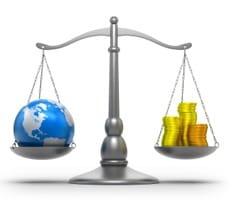In a podcast for Cambridge Judge Business School Dr Chris Hope, Reader in Policy Modelling at Cambridge Judge Business School, argues that a Climate Change Tax of 75 GBP per tonne of carbon dioxide would allow VAT to be reduced to 15%.
However, Dr Hope admitted that there was still concern about the accuracy of data on climate change.
“There remain 2 major problems. The Copenhagen conference, which was meant to provide a solution, was regarded as a failure. It didn’t come up with any concrete solutions, and I think people have become very disillusioned. Secondly, there has been some concerns about climate scientists and experts following on from the University of East Anglia emails issue. People no longer unequivocally trust climate scientists, they will need to be persuaded a little if there is going to be any action on climate change.”
But Dr Hope believes that the new Conservative Government’s agenda to cut public spending would play to his argument to see a new system of taxation introduced to tax carbon emissions more efficiently.
“It provides a big opportunity, we have a deficit of about 160 billion pounds each year, about 12% of GDP. The new government wants to bring this down by spending cuts and new taxes, and VAT will rise. This provides an opportunity because if we do tax emissions of carbon dioxide and other green house gases properly, we could probably cut those other taxes, and VAT could then go down to 15% again, and we could cut NI contributions by about 1%. We would then still have some money left over to protect the poor and the elderly against the worst effects of any energy price rises.”
He said that this strategy would be less risky than raising other taxes and that a new carbon tax of 75 GBP for every tonne of carbon dioxide would be about right.
“It will be less risky, in terms of stalling any recovery, than other tax rises or other spending cuts that others are proposing. It looks as if a climate change tax would be much better for the economy and would lead to it growing faster than if we were to introduce VAT, income tax or NI tax rises.
“It looks as though, if we do all the calculations, that the proposed rate of climate change tax, will increase the cost of electricity from coal by about 60 per cent, gas prices by about 50 per cent, and petrol by about 18p per litre, and add possibly about 60 GBP to a return air ticket to the South of Europe.
“The key thing is that nuclear power and renewable energy efficiency would not be subject to this climate change tax, because they don’t cause a problem and would look far more attractive economically than they do at present.”
Dr Hope said people would benefit financially with the introduction of a climate change tax.
“For the average person the climate change tax would be at least outweighed by reductions in other taxes, so the average family would be better off over all. If you then increased your energy efficiency and took other steps, you would be far, far better off.”
Dr Hope said that such measures would work in the short and longer term and that if the West acted now the developing Countries would follow suit in the future.
“All the studies that have been done suggest that we can cut our emissions radically by these sort of measures by 30% over the next 10 to 15 years and 80% over the next 40 years or so and it looks like the best shot we have of dealing with this problem.
“We have to take the first step, we are the advanced countries, we have been causing the problems, and it is us who will have to deal with it.”


